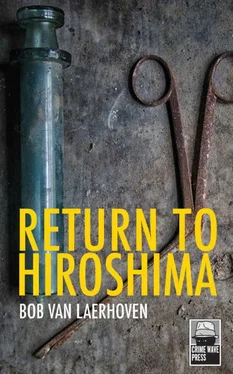Beate stares at Rokurobei. She hasn’t forgotten what Adachi told her about him, about the demon’s nickname: the Lord of Lies. But the intense sadness of the man seems genuine, real.
“My love for her made her my daughter, do you understand? But why should you? I was completely in the dark myself. Repugnance, fear, arrogance, cruelty: these are the emotions that inhabit my world. Make no mistake, Miss Becht: everyone talks about love, but such negative emotions are the flipside of the same coin. We dabble in love with the greatest of pleasure because it gives our most perverse deeds a hint of refinement. Murdering someone for love is less vulgar than murdering for profit or revenge. Isn’t that what they say? I was sixteen, Miss Becht, when the demon I now represent took possession of me, here in this city. You may not believe in him, but the bomb had just been dropped and it had torn reality asunder. Or had it exposed reality? The choice is yours. At that moment, as I watched people take each other’s lives out of compassion and love, it didn’t seem so strange that the demon came to inhabit me and I thus became the one people call Rokurobei. A tormented spirit, certainly, capable of the most horrific deeds. But even a demon can transcend itself and love someone, without reason, without desire for gain, without purpose.”
“Dr Adachi was a sweet…”
Norikazu jumps to his feet. “I know what you’re going to say. But listen to me: I don’t understand why everyone is against me . I just told you about the bomb and what it did to this city and to me. I met survivors and wanted to help them cross the only remaining bridge over the river. I called out to them, told them to follow me. Me! Japan’s legitimate sovereign. And what did they do? They screamed I was crazy and jumped into the river. They all died, Miss Becht. I’ve never forgotten. I then realised they weren’t worthy of me and that the old Japan had entered the realm of fable once and for all. My Japan is a Japan of courageous men willing to do the right thing and accept the consequences when they make the wrong choices. Your Adachi may have been a sweet man, but he made the wrong choices. I killed him out of self-preservation… and out of compassion. I could have let him suffer much more than he did.” The demon takes a step towards her. “What is good and what is evil, Miss Becht? Everyone should know the answer to that question, but no one does. What should I do if killing one person could save the lives of hundreds of thousands? Should I stand aside and watch my people throw themselves over the edge like lemmings? My goal is a glorious future from which the weak have been banished. Does that sound hard, callous? Think about it, Miss Becht. The weaklings of this world are responsible for nothing but misery and contradiction.”
Beate peers into his glimmering almost lightless eyes. Once again his coarse hands came to rest on her shoulders. This time she shivers from head to toe, as if a surge of electricity had coursed through her body. “You think I’m going to hurt you, hurt you a lot, until you tell me what Takeda is planning. You’re wrong. You’re going to tell me because you want to. Then you can go home. Pretend this episode never happened… that it was all a dream. You’re the kind of person who can picture such a dream in your mind. Better still, you’re the kind of person who can transform what I say into the truth .” With these words he takes her right hand and places a little box of Largactil on her upturned palm, the neuroleptic she had left behind in her hotel room a couple of days earlier in all the excitement.
To her surprise, mixed with a hint of shame and bitter resignation, Becht realises that he’s right. She’s convinced she’s dealing with an arch deceiver unable to speak the full truth whatever the situation. Or perhaps he speaks the truth as he sees it at any given moment, she suddenly concludes . She remembers what the world was like when depression had taken complete hold of her: a sinister stage play in which everyone wore a mask, a drama filled with invisible intentions arching through the air like electricity, a tragedy polluted by furtive shadows. Her malady gave her the impression that the buildings and the people she saw were nothing more than pixels of energy bundled together by an insane artist who could shift around the worlds inside him like pieces of chess.
She wants to return to her photographic world of fauns and satyrs, of melancholy lust in the corners of S/M dungeons, of contorted, smarting limbs.
A world in which she is in control.
Norikazu’s face moves closer. There’s nothing hypnotic about those eyes, she observes, in spite of what she first thought. They’re mirrors.
“If you allow the truth to be what it is , Miss Becht, then I have a peace offering for you… something I’m sure you’ll find tempting.”
Kyoto – Ryokan Yachiyo – 34 Nanzenji Fukuji-cho – Takeda – evening, March 17 th1995
Spring storms can take you by surprise at this time of year. The weather has been quirky of late. In the past you could trust it, but not these days. The wind tugs and jerks at the motel he has chosen for his stop, an old Gonkan building. Takeda can feel the vibrations. He’s lying on his back, has his hands folded over his belly like a corpse in the morgue. His eyes open, close, open again.
He’s not sure if he’s half-awake or half-asleep. His lips are moving, but it’s barely noticeable. He’s saying the words he’s always wanted to say, all his life… words to his father.
When he thought he had found him he said the wrong words and did the wrong things.
Takeda was twenty-seven and was preparing for the Junsa-bucho exam, one of the force’s most difficult. He asked himself every day why he felt different from the other candidate sergeants. They wallowed in the standing policemen enjoyed in Japanese society. They stuck out their chest when someone addressed them with the appropriate respect. Didn’t they see that people were complaining behind their backs about police selling their authority to criminal organisations, that people were laughing at them? Everything was turned on its head in 1973. Society changed at breakneck speed. Takeda saw new recruits arriving who knew little if anything about the disciplinary principles he had encountered seven years earlier in the police academy. If you didn’t pay attention, made stupid mistakes, or proved yourself incompetent, you were rewarded with a slap in the face. No one even considered questioning the authority of their superiors, let alone asking them to explain the orders they doled out. He made up his mind to uphold the military principles of order and clear instructions to the letter, once he was a sergeant. He didn’t go to the pub after work, where his colleagues would toss back as much sake as they could manage in the shortest time and then head to the red light district and the whores. That came later, when he thought he had murdered his father. He had married two years earlier. His wife was extremely modest and retiring, and didn’t seem to mind that he was a half-breed. When Takeda grumbled that no one took him seriously, she tried to placate him. Sometimes he accepted it, sometimes he got angry and beat her. He was dissatisfied, resentful, full of repressed aggression, but he didn’t know why. His decision to become a policeman had to do with his longing for recognition. But what kind of recognition? Deep in his heart he had a problem with authority, although he was always meticulous and punctual, and grovelling towards superior officers who might help his career. Judo was his safety-valve, but in spite of his weight, strength and decent reflexes, he found it hard to master the technique. For some inexplicable reason – inexplicable to himself at least – he was always extremely nervous, even during training. As a result he often lost against opponents who were twenty-five kilos lighter. Takeda detested his anxiety and blamed it on the mortal terror he had sensed as an unborn child in camp Pangkalan-Balei, in the womb of a desperate woman who didn’t want him. But when it wasn’t a question of points or classification, when Takeda the policeman was attacked on the street by a thief or a drug user, he reacted with skill and determination, and sometimes even went over the top. He had received a couple of warnings for excessive aggression during an arrest. Accustomed as they were to his docile behaviour, his superiors were taken aback at times by a curt remark, by an unexpected flash of aggression, which was usually followed by a profusion of apologies.
Читать дальше












